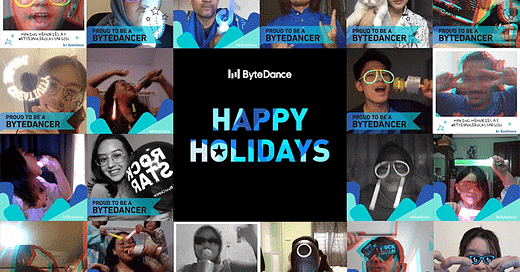TikTok Overtakes Google for Global Attention
I like to write about the future, for years I’ve been warning that Chinese firms would disrupt American BigTech. These sorts of articles are controversial for some, political for others but they are also honest analysis for me. It's the kind of news Silicon Valley and its aging admirers don't usually like to hear.
Still for GenZ, it's obvious what is happening. In the bifurcation of the internet, they are dancing to the beat of their own drum. ByteDance's AI recommdantion engine has perfected sentiment gamification.
Now it seems TikTok has overtaken Google in global traffic. How can this be? TokTok is just a GenZ app, a video-sharing platform that has now just pushed Google aside to become the most popular website in the world, according to web performance and security company Cloudflare’s 2021 Year in Review internet traffic rankings.
Traffic Ratings and Attention Economy KPIs
Cloudflare’s explanation for how Radar calculates site popularity says its assessment is “derived from aggregated data from the 1.1.1.1 Public DNS Resolver” and “a range of data that Cloudflare has about global Internet traffic patterns.”
As the Register points out, just how Cloudflare decides its rankings is unknown, while the fact that Radar launched in September 2020 means its assessments for that year were based on less data.
While in September, 2021 TikTok (on Android devices) overtook YouTube in viewing time, it seems TikTok overtook Google in February, 2021 according to the Cloudflare data.
China has GenZ in Their Back Pocket
GenZ is the biggest global cohort by wide margins. They even prefer ByteDance to Spotify in terms of music streaming. ByteDance could essentially create any app and they would get GenZ on their side.
ByteDance is the most valuable unicorn that’s not gone public yet. It’s based in Beijing and over the last five years is by far the best app and consumer-AI maker in the world. By a very wide margin.
In a blog post, Cloudflare noted that comparing the numbers between the two years could yield potentially misleading results, since the service only culled data from September to December in 2020 (compared to all 12 months being accounted for in 2021). According to Cloudflare, TikTok first peaked in the global traffic rankings on Feb. 17, 2021, followed by a few more days in March and June and then, finally, a more permanent stay at the top beginning in late August.
TikTok’s popularity is a wake-up call to Silicon Valley and especially Google and Meta that their time as an Ad duopoly is coming to an end. In recent years Amazon has also been taking over consumer search from Google as the starting point for consumer journeys. Google also has an antitrust history of favoring its own products.
In China, ByteDance is disrupting even the likes of Alibaba in digital advertising and E-commerce heading into 2022. ByteDance even without TikTok and Douyin, would be an incredible company. They would have become an Ed-tech and gaming giant without the recent Chinese regulatory changes to the Ed-tech in China. Their are hitting E-commerce very hard in 2021, way harder than Meta (Facebook, Instagram, WhatsApp) ever managed to do in all those years headstart.
TikTok is just one app, just a tiny example of how China is going to disrupt BigTech. In terms of the time spent in video, YouTube is still ahead in time spent overall, no doubt because of its two billion users compared to TikTok’s roughly 700 million, BBC News noted in September. So what’s going on here?
Several executives at companies like Meta (Facebook) and Spotify have expressed concern in the past few months (and years) about Generation Z, people born between the late 1990s and the early 2010s. Their products are just not that sticky compared to products of ByteDance. If Roblox understands the Alpha cohort, Snap understands GenZ, but not many apps do.
TikTok became the world’s most popular web site during 2021, according to Cloudflare’s Radar service. I don’t even understand why TikTok does not appear on Alexa’s global rankings. TikTok is one of China’s best attempts at bringing its system of AI global in the 2020s. It’s so enmeshed in Neo Surveillance Capitalism of China that the U.S. Military considers the app a cyber threat. Whatever it is, it certainly has better consumer-AI stickiness for users.
When TikTok starts to rival YouTube and Google’s hegemony on global eyeballs, American BigTech has a problem. ByteDance is just the first (just one) company of a new generation of Chinese companies with the talent, ambition and scalability to expand outside the borders of China.
America’s Ad-based monopolies have basically never even seen real competitors to their totalitarian advertising paradigm of how the algorithmic internet works. Until now. 2022 is going to continue this trend.
China’s wolf diplomacy (vs. panda) though is making it and its apps quite unpopular for other reasons. TikTok, the short-video platform, was an instant success in India soon after it launched in September 2016. ... But, TikTok was banned in India on June 29, 2020, over national security issues.
If you want to see what I've written today just search my name on Substack and scroll down: https://substack.com/profile/21731691-michael-spencer






